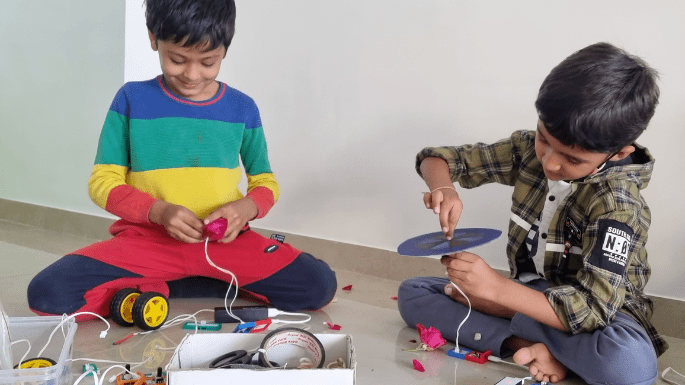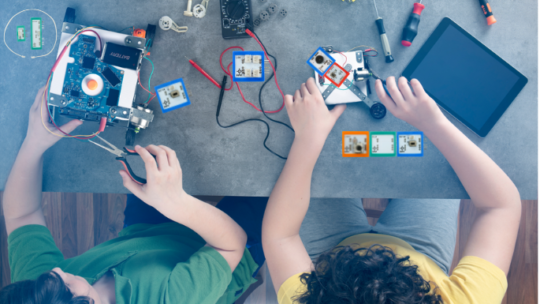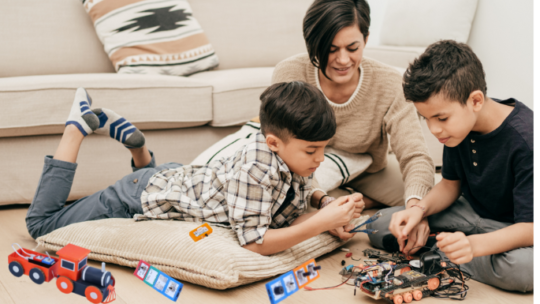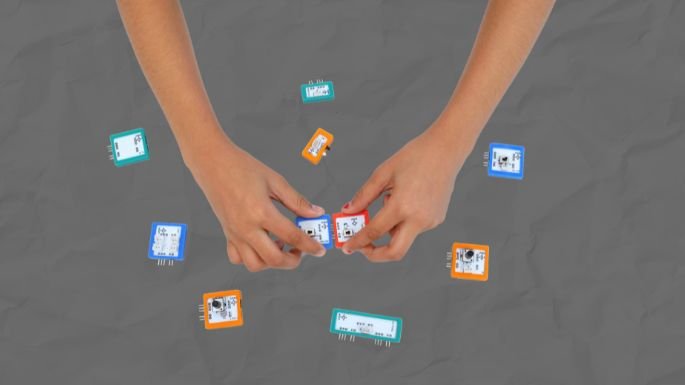Robotics for Kids – A Complete guide for Parents and Educators


These days, STEAM programs have gained popularity amongst kids. (STEAM = Science Technology Engineering Arts Maths). Robotics is one such discipline that falls under the STEAM umbrella. For kids who have never tried it before, it provides them with an outlet for their creativity while keeping their minds active.
This article, though written on robotics for kids, equally benefits beginners of any age. Parents and teachers can use this as a learning resource while discussing and teaching robotics to kids.
Before we delve into various factors related to robotics for kids, let’s understand what this discipline is about.
What are robots in simple words for kids?
A robot is a machine that does some tasks for us. Maybe that’s the most basic definition of a robot. But let’s decompose the definition of robots to better understand them.
- A robot is a machine.
- It is designed to do specific tasks for humans.
- It may or may not need human intervention to do a specific job.
- It may or may not be operated by a computer program.
- A robot would do the tasks with at least some level of autonomy. If it’s a machine with zero autonomy it’s just a machine and not a robot. In other words, robots need to have at least a certain level of “intelligence” to do the tasks.
- It may or may not look like a human or other animal. Need to clarify this as mostly we have seen robots in this form, especially in movies.
Simple examples of Robots at home
Now let’s understand this definition of robots with some examples. You can discuss the very same examples with kids and ask them to evaluate some other machines as well to decide if they are robots.
1. Hand blender
- Is hand blender a robot? To answer this, let’s check the definition point by point.
- Is it a machine? Yes, it is.
- Does it do a specific task? Yes, it does.
- Does it need human intervention? Yes, it does.
- Is it operated by a computer program? No
- Does it perform the tasks by itself? No!
Conclusion: A hand blender is just a machine being used by a human but is not a robot.
2. Washing Machine
Ask the above questions one by one and you will finally realize that a washing machine is a robot. It has some level of intelligence. It can decide how much detergent it wants. It takes the decision of volume and temperature of water it needs. There are washing machines with even more intelligence.
So yes, a washing machine is a robot. OMG, we had a robot in our home for years now!!
Are your two-wheeler and car a robot? Is a drone a robot? You decide and discuss more machines to check if they are robots
What is robotics?
This whole field in which we study, design, and develop such machines called robots, is known as Robotics.
Now let’s discuss some important questions related to robotics for kids which might be popping up in your mind.
Why teach robotics to kids?

Robotics encourages curiosity and creativity in kids. Aside from developing crucial problem-solving skills, robotics can also be an excellent activity for stimulating creativity and a curious mind. Robotics gives your child a toolkit and challenges them to build something new.
2. Promote a growth mindset
Robotics also allows kids to use their minds towards creating things that are either a complete solution or a part of a solution. This is an important practice especially with the company nowadays being creator based.
3. Multidisciplinary Learning
The field of robotics is multidisciplinary, encouraging children to explore many disciplines at once while studying robotics, disciplines that majorly impact their STEAM learning.
4. Action-based Learning.
Robotics is a field that involves learning by taking action instead of just reading theory. This means that when your child is learning robotics, he/she is engaging in active learning.
It gives an outlet to their curiosity and creativity, while simultaneously developing their problem-solving skills.
“Robotics in itself can also be taken up a career path, which has many future jobs and much future scope.”
What is the right age for kids to start learning robotics?
As per the research and the standard patterns, kids are ready to learn robotics at age 8 or 9. However some kids can start learning at age 6 and few may cop-up well only after age 10. You know your child best. But yes age 12 or age 14 children can learn robotics for sure.
Some parents may be concerned about starting their kids into robotics too early.
Now, let’s see it this way. Does your child know how to interact with Google Home or Alexa? Do you feel amazed these days, how children at the age of 3 navigate through youtube, while it still feels like “a task” for an aged person?
Kids are interacting with technology every day, through smartphones and smart devices in the house.
The critical and creative thinking skills that your child develops in robotics will stay with them well into adulthood- meaning they will be able to think through difficult issues on their own, like the next step to take in solving a problem. So consider robotics and robotic toys as one of the development tools especially if your child is interested in engineering and science.
What to teach about robotics to kids?
Robotics is a multi-disciplinary domain combining several sections of science and technology. At the top level, a robot has 4 different components.
- Machine. Body, Motion, Mechanics, Joineries, and the engineering portion.
- Electronics. Circuits, controllers, Arduino, Raspberry Pi, etc.
- Design. The aesthetics of a robot, looks, colors, and body structure.
- Programming. Algorithm, logic, the intelligence portion.
When we are teaching robotics to kids, take care of two things
- Initially let them explore all of these.
- Later focus on things they love and show interest in. Expecting them to master all of these would be mostly unrealistic.
How do we teach robotics to kids?

4 Things you can discuss with kids about Robotics
1. Discuss automatic machines around you
You can begin teaching your kids by making them recognize activities where automation is being used in the current industries. Encourage them to recognize where automation can be applied now, or which activities can be given to a machine to do. Bring in relevant real-life examples such as escalators, smart taps, or automated glass doors in malls/airports or other public/private places.
2. Discuss assistants
Discuss the concepts of robotic assistants such as Alexa, Google Home, etc, their benefits, how it was before the technology, and what they think can the domain of robotics include more to be of better assistance.
3. Movies
You can also involve various motion pictures as a part of your discussion such as Iron Man, where robotics and AI are shown.
4. Discuss the Pros and cons of robots
Have open discussions about the good and bad parts of robotics and the benefits and disadvantages of machines and automation. Take references to Indian Movies such as Robot, where they brought the emotional aspect of robots.
5 Activities to be done to teach robotics to kids
1. Industrial visits
If there are nearby industries operating with robotic machines, you can consider a visit and see the robotics working on various processes of production and storage. You can consider museums, warehouses and malls too if there are robots and robotics systems implemented.
2. Working on craft projects
Creating 3D shapes, bodies, and objects using various craft materials should be a great starting point. Let them shape and color the things.
3. Making with blocks and plates
The making journey can go further to making motorized machines using toys and kits like Lego, Mechanix, Megnatiles, and others.
4. Create robots and STEAM projects using DIY Robotics Kits
Making circuits with Resistors, capacitors, and transistors on a breadboard, soldering them on PCBs, and understanding Arduino pin diagrams are not everyone’s cup of tea. And in many cases, kids do drop learning robotics after seeing all of these.
Hence a good approach would be to give them robotic toys and kits like SnapCircuits and Havi’s DIY Robotics starter kits. The beauty and easiness of these toys will attract and inspire kids to learn electronics. You can move to complex things once they develop interest.

You can start initially with screenless coding activities to develop their logic and interest in programming. Try building algorithms too. Later can ask them to write simple programming projects in tools like code.org, scratch, and later on python.
5. 10 Robotic projects for kidsFind here 10 robotics for kids projects which you can help them execute at school or home. All of these can be done by kids using Havi elements and the user manual they provide in the box.
1. Make a Robotic Insect (Bug).
2. Make a Scribble bot (Art bot)
3. Make an edge avoiding robot
4. Smart streetlight project
5. Smart farm watering system
6. Make a moving solar system working model
7. Make a line follower robot
8. Accident prevention system for hairpin bend zones
9. DIY Automatic senitizer dispenser
10. Fire extinguisher
Top robotics competitions for school students
Bhuvana, a 12-year-old student from Ranebennur, a small town in Karnataka, India, was always fascinated by robots. She loved watching science fiction movies and dreaming about the future when she would build robots. One day, her school announced a robotics competition, and Bhuvana knew he had to participate. Bhuvana’s father purchased a Beginners’ Robotics Kit for her and she did the rest of the job!
Robotics competitions are a great way for students like Bhuvana or 10 yo Siddharth from Mumbai, to explore their passion for robotics and learn new skills. These competitions challenge students to design, build, and program robots to perform specific tasks, ranging from soccer matches to obstacle avoider. Here are some national and international robotics competitions for Indian school students.
- Robocon India
- FIRST Global Challenge
- World Robot Olympiad
- VEX Robotics Competition
- Robocup Junior
- National Robotics Championship
- Technoxian Robotics Championship
- Indian Robot Olympiad
- Techniche Robotics Challenge
- International Robotronics Competition
Participating in robotics competitions can be a great way for students to learn new skills, meet like-minded people, and gain exposure to new technologies. While the difficulty level and price of each competition may vary, they all offer a unique experience that can help students grow and develop.
Robotics Curriculum
Havi.co is not into teaching directly but we are passionate to support the education. Our founders and team members are highly qualified both in terms of their degrees as well in their experience. We have created complete robotics course for kids which is being followed by 300+ strong community of schools and freelance teachers who formally conduct robotic courses for kids using Havi’s Robotics starter kit. Together with them, we have constantly evolved a robotic curriculum and we provide access to that for free. Please Contact us to know more.
Why is robotics important in the future?
1. Economic impact
Robots and AI contribute to the economy by improving the quality and productivity of products. Companies that use robots are more likely to stay competitive and vital, leading to economic growth.
2. Safety and efficiency
Robots can perform dangerous tasks in hazardous environments, eliminating the risk to human workers. They can handle heavy loads, toxic substances, and repetitive tasks, improving safety and efficiency in industries.
3. Technological advancement
Robotics drives technological innovation and advancement. It pushes the boundaries of what is possible and opens up new possibilities for industries and society.
4. Job creation
While robotics may replace certain jobs, it also creates new job opportunities in the field of robotics itself, as well as in related industries that require skilled workers to operate and maintain robotic systems.
Conclusion
Robotics for kids is exciting and enjoyable and it does not limit their learning to a classroom. With robotics, kids can learn a lot about themselves and the world with the help of robotic learning. They can discover themselves and know what they like and dislike, what their strengths and weaknesses are. It allows them opportunities to improve various social skills like communication, teamwork, and critical thinking. Robotics for kids can guide them to make their future. Now, as parents/teachers, it’s your time to bring that interest to your kids to develop a thoughtful future for them.
Frequently asked questions
1. Do you offer any online/offline robotics course for kids?
We make DIY robotic toys and kits, hence kids and adults can create and learn robotic creations themselves with help of manual and videos.
However we understand that kids, many a times need handholding and that’s why we have a network of trained and qualified “Teaching Partners”. We can connect you with trained teaching partner and who will execute a complete robotics course using Havi’s DIY Robotics Starter Kit.
Teaching partner will charge you their service fees and we don’t charge any commission to you or teaching partner for that.
2. Which robotic kits and toys should I choose for my child?
Sure, here are few facts which will help you making right choice.
1) If your child is of age 6-7 and you want to start with a lesser investment, Go for Havi Elements – DIY Object Sensor Projects Kit OR Havi Elements – DIY Smart Lighting Kit.
2) If your child is interested in lights and LEDs, go for Havi’s DIY Smart Lighting Kit.
3) If your child is more in to sports, fitness etc…. buy Havi’s DIY Object Sensor Projects Kit.
4) Havi Elements – DIY Robotic Car Kit is perfect gift for car lovers.
5) If you are looking for a serious, long term play for purposes like serious robotics learning, help in school projects etc… go for Havi – DIY Robotics Starter Kit. If you are buying Starter kit, no need to buy other 3 kits.
For more detailed comparison, check here
4. Do you provide any support for robotics for kids?
Yes. If you are a parent or a teacher and want to teach robotics to your kids and students, we can help you with complete course, worksheets, videos and training related to robotics. All for free! Contact us to know more.
5. Can I become a teacher at your institute?
We are not any institute. We make robotic toys and kits. But we are always looking for enthusiastic teaching partners who can support with robotics to kids using our kit. Know more on become a partner.
6. Do you have any activity worksheet related to robotics for kids?
Yes. We have prepared a robotics quiz. Download the 10 basic robotics questions & solve them. Verify the answers.

